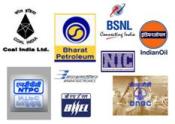In India, public sector undertaking (PSU) is a term used for a government-owned corporation (company in the public sector). The term is used to refer to companies in which the government (either the Union Government or state or territorial governments, or both) owns a majority (51 percent or more) of the company equity. A Public Sector Undertaking is a corporation in the public sector in India, where management control of the company rests with the Government; it can be Central Government or the State Governments.
Maharatna is the most coveted status given to a PSU in our country. These are the 5 Maharatnas of our country currently:
- Coal India Limited (CIL)
- Indian Oil Corporation Limited (IOCL)
- Oil and Natural Gas Corporation (ONGC)
- National Thermal Power Corporation (NTPC)
- Steel Authority of India Limited (SAIL)
Other major PSUs include: Bharat Heavy Electricals Limited (BHEL), Defence Research & Development Organisation (DRDO), Gas Authority of India Limited (GAIL), Power Grid Corporation of India Limited, Indian Oil Corporation.
The list of PSUs is very long and so are the job opportunities available with each of these government organizations. But there exists a stiff level of competition for these government jobs.
PSUs Recruitment Process
The most important criteria for securing a job in the PSUs is the Graduation score of a candidate. One should maintain a minimum percentage of 60% (or first class CGPA score) to be eligible for the recruitment process of any PSU. They are very stringent about the percentage criteria and some of the PSUs even have a cut-off of 65%. Even while considering the list of shortlisted candidates for the round of Personnel Interview, a heavy weightage is given to the graduation score (including SSC and HSC score) of the candidate.
There are two ways through which a PSU hires:
- On-campus Selection
All these PSUs have a list of campuses that they visit every year for recruiting graduates. The list is decided by the recruitment committee of respective PSUs and generally consists of Tier 1 colleges. The company visits the campus, interviews the list of shortlisted candidates (shortlisting is done on the basis of graduation, SSC and HSC score) and then hires the candidates accordingly.
- Off-campus Recruitment Drive
The majority of the recruitment is done through the off-campus recruitment process conducted by each of these PSUs. The information about the off campus drive is published in all the newspaper dailies and also mentioned on the respective websites.
- Initially the candidates are filtered according to the marks obtained in B.Tech/ B.E, 12th & 10th. After applying the cut-offs the list of candidates is prepared for the written round.
- The written round consists of multiple-choice questions of the relevant subject discipline of the candidate.
- After clearing the written, the shortlisted candidates are interviewed by a panel.
After clearing the PI the candidate is finally selected as Graduate Engineer Trainee (GET).
GATE Advantage
- Graduate Aptitude Test in Engineering (GATE) is an all India examination administered and conducted jointly by the Indian Institute of Science (IISc) and seven Indian Institutes of Technology (IIT) for admission into their post-graduate programmes. Some of the PSUs also consider GATE score and give preference to candidates in the written round of their selection securing a decent score. There are also some PSUs (ISRO, NTPC, IOCL, IOC) which give direct interview calls to the candidates solely on the basis of their GATE score.
Advantages & Challenges of working in a PSU
1. Advantages
The work culture in a PSU is less stressful as compared to private sector as work, not profit is the main focus. It is also because the appraisals in a government job are based on seniority and not productivity, the employees tend to relax a bit.
With government job comes job security. Even in times of recession, when lay-offs are very common in private sector, a government sector employee can feel secure about his job. Many retirement benefits like pension plan, PF and other retirement schemes are associated with government jobs in India which are not observed in private sector.
Probably, the best thing about government jobs is the 9-5 work timings. The employee is paid accordingly if he/she works overtime.
- Challenges
The growth opportunity in a government job is very limited as promotions are based on the basis of seniority and not on the basis of meritocracy. So, the growth depends on the tenure of the employee with the organization.
- Less Competitive Environment
As, discussed the work culture in a PSU is very relaxed and this may hamper the performance of an individual
 Featured Sector
Featured Sector

 Featured Sector
Featured Sector

